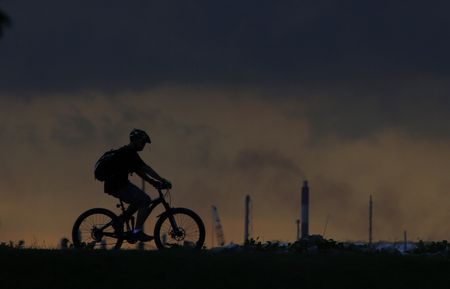By Emily Chow
SINGAPORE (Reuters) – Singapore’s energy regulator will be introducing new emissions standards for new and repowered fossil fuel-fired power generation units in 2023, a minister said on Wednesday.
The Energy Market Authority (EMA) will consult with the industry in the coming months and will release details on the standards subsequently, Low Yen Ling, the minister of state for the ministry of trade and industry, said at the Singapore International Energy Week conference.
The new rules are part of the implementation of a law the city-state passed last year that allowed the EMA to set greenhouse gas emissions standards.
The measure also follows Singapore announcing plans to reduce its emissions target for 2030 to 60 million tonnes of carbon dioxide (CO2).
The city-state will also enhance the efficiency of its power plants “by requiring all new generation units to use the best-in-class technology available,” said Low, without elaborating on the technology required.
Low also announced that Singapore and Japan signed a memorandum of cooperation (MOC) to advance energy security and transitions.
The memorandum will enhance bilateral cooperation “to promote investment across the liquefied natural gas (LNG) value chain, exploration of opportunities to support LNG procurement, and drawing on our LNG connections to establish regional supply chains of low-emissions fuels,” said Low.
The new MOC builds on a previous memorandum that coordinates the use and support for natural gas supply chains with low-emission technologies like hydrogen, ammonia and carbon capture, utilisation and storage.
Last month, Japan also signed a memorandum of cooperation with Malaysian state energy firm Petronas which includes consideration of joint upstream investment, cooperation on cutting methane emissions, mutual assistance in fuel supply and the use of LNG tanks in the event of an emergency supply crunch.
(Reporting by Emily Chow; Editing by Christian Schmollinger)

